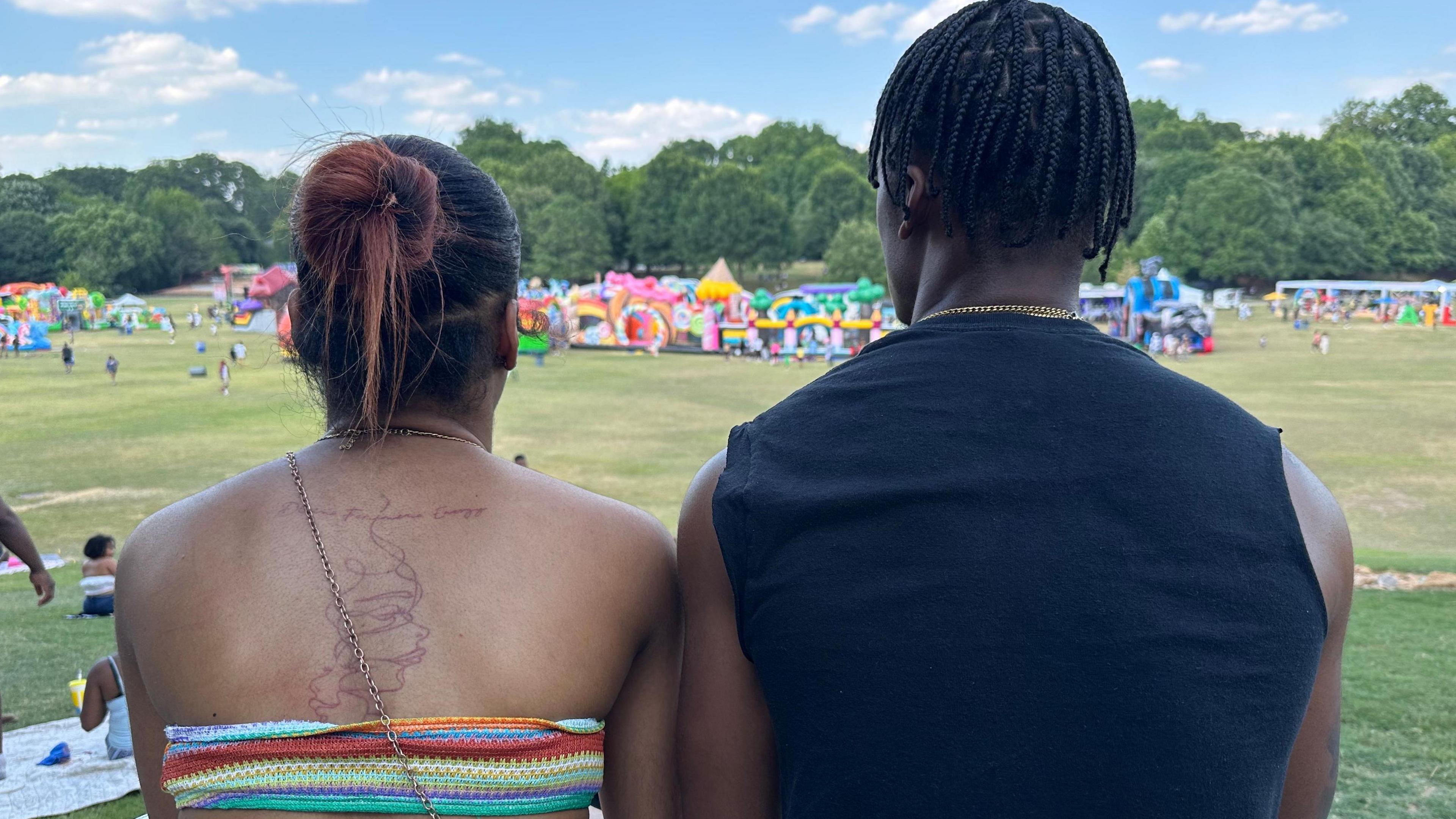'It's in God's hands now': Georgia voters brace for close election
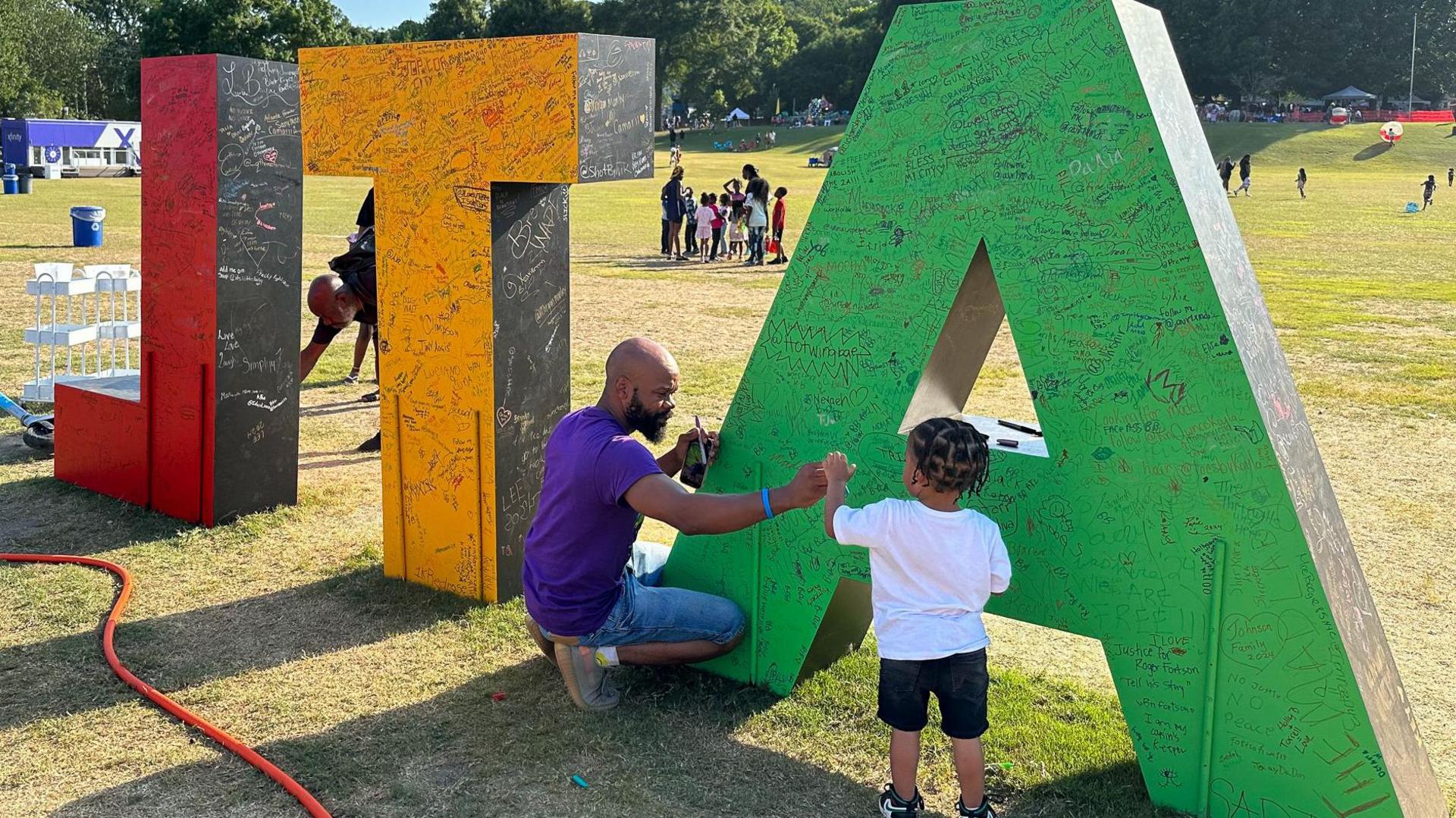
Torino Henry (left) says he thinks both Joe Biden and Donald Trump are bad candidates. He doesn't plan on voting for either
- Published
Joe Biden defeated Donald Trump by fewer than 12,000 votes to win the crucial state of Georgia in the 2020 election, elevating its status as an influential political battleground. The two men will face off in the first presidential debate in Atlanta on Thursday, putting a spotlight on the pivotal role Georgia will again play in November.
On a hot summer Sunday, hundreds gathered in Atlanta's Piedmont Park to celebrate Juneteenth, America’s newest national holiday, which commemorates the end of slavery.
There were smiles and laughter. Corn dogs and curly fries. Pride and pain.
Jimmy Hill was there, resting beneath the shade of a tree. He sat next to an installation of columns erected in the park, each decorated with synthetic roses and the faces of black Americans shot and killed by police. One of the faces – Jimmy Atchison – was Mr Hill’s son.
Mr Hill voted for Joe Biden in 2020, lured by the Democratic candidate’s promises for police reform. “I’ve always voted Democrat,” the 62-year-old said. But four years later, his allegiance to the party is beginning to waver.
“[Biden] hasn’t done anything on police reform,” Mr Hill said. “The conversation has gone out the back door.”
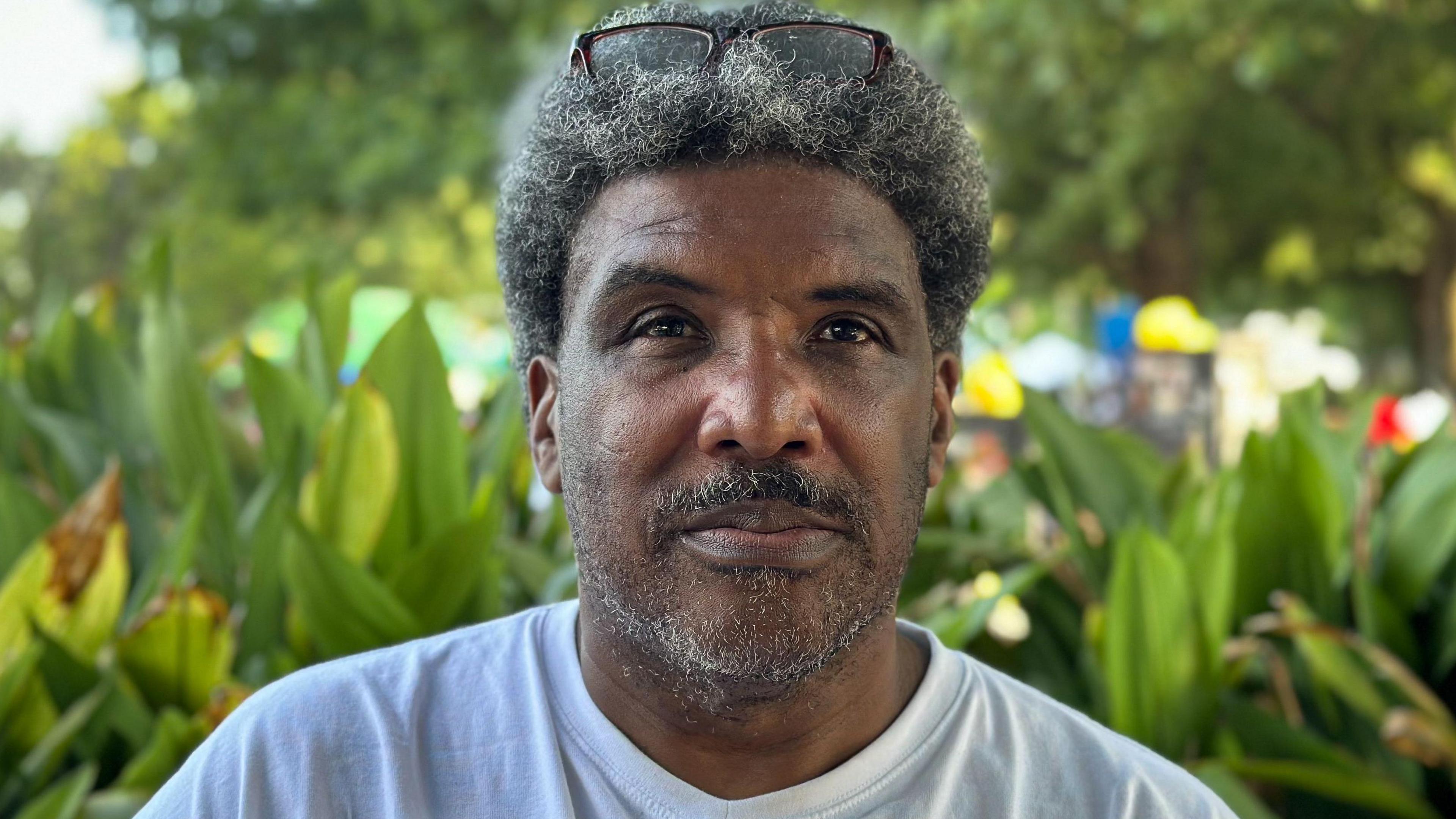
Jimmy Hill has seen two sons killed by guns. He's voting against lawmakers that wish to ease gun access
His uncertainty reflects broader concerns among Georgia's black and Latino population, a reliable Democratic voting bloc now showing signs of a crumbling coalition. The group voted in record numbers in 2020, helping Joe Biden to win the state by less than 1%. The upset victory arrived on the heels of a long-diversifying population and high-profile local Democrats also on the ballot.
On Thursday, a mile from the Juneteenth celebration in Piedmont Park, President Biden and his Republican opponent Donald Trump will come under the lights of the primetime television debate stage for the first time in four years.
Each man - president and former president - will be trying to convince the nation that they deserve another term in the White House. The road to get there runs through battleground states like Georgia, where voters know they play an outsized role in deciding who becomes president.
In November, the razor-thin race is set to be decided here and in a handful of other states across the nation: Wisconsin, Pennsylvania, Michigan, Arizona and Nevada.
Current polling shows Mr Biden has lost significant ground in Georgia. A March survery by the BBC’s media partner CBS News found the former president leading President Biden by 3%.
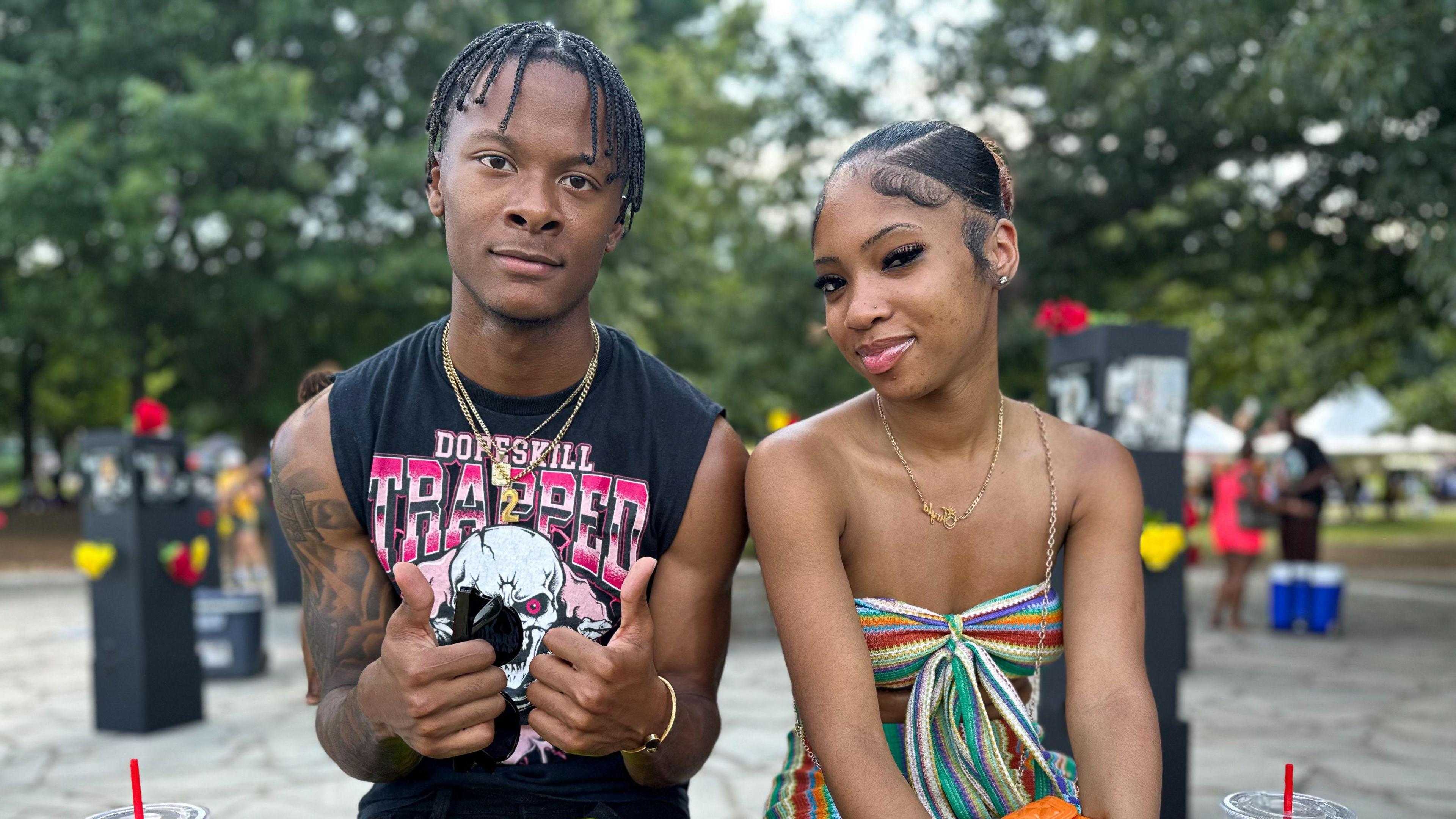
Shaun Gray (left) says he will not vote for Joe Biden and is considering Donald Trump
A ‘perfect storm’ in 2020
Before 2020, a Democratic candidate for president hadn’t been elected in Georgia since 1992.
But a confluence of unique events helped push Joe Biden over the line, including record voter turnout from the state’s growing population of young, black and Latino voters.
In 2020, a deadly pandemic had engulfed the globe and shut down much of daily life. The election also came amid a nationwide racial reckoning following widespread protests over the police killings of George Floyd and other black Americans — an issue Mr Biden vowed to tackle on the campaign trail.
Two months after Mr Biden’s win, the state elected two Democrats, including its first black senator, Raphael Warnock, to the US Senate, in runoff elections. The upset victories flipped the state’s two seats from red to blue and handed control of the upper chamber to Democrats.
“2020 was a different beast,” said Kendra Cotton, executive director of the New Georgia Project, a non-partisan organisation that leads voter outreach efforts among metro Atlanta’s communities of colour. “When you talk about getting people out, it was like a perfect storm.”
Many in Georgia attribute record turnout to the state’s grassroots coalition, a decade-long project led by Democrat and former gubernatorial candidate Stacey Abrams. Abrams founded the New Georgia Project and Fair Fight, two of Georgia’s largest voting rights organisations.
But many of the dynamics that motivated black and Latino voters and powered Mr Biden’s win have disappeared. And some organisers worry new challenges – from inflation to the Israel-Gaza war – are causing Mr Biden’s grip on the consequential voting bloc to slip.
“People are concerned about the cost of living. The rising housing costs. The lack of affordability,” Ms Cotton said.
The fallout from the Israel-Gaza war is “something that’s weighing on the hearts and minds of voters we reach out to,” she added. “Voters are not enthusiastic about their choices."
The 2024 landscape has left Republicans and Democrats puzzled about what will happen in November.
Elisha Bennett, a Republican, put it this way: “It’s in God’s hands now.”
When is the first debate between Biden and Trump?
- Published27 June 2024
Age anxiety hangs over first Biden-Trump debate
- Published27 June 2024

Trump paraphernalia on sale at the Trump Store & More in East Ellijay, Georgia
Trump ‘took care of us’
Roughly 77 miles (123km) north of Atlanta, in the rolling hills of East Ellijay, the tone among voters contrasts heavily with those at Piedmont Park.
There, amid the pockets of wild daisies and gun stores dotting the road, lies the Trump Store & More.
“I voted for Trump in 2016, and 2020, and I will vote for him again,” Fran Diemer, the store’s clerk, said. “He’s the best thing to ever happen to this country and we need him back.”
Standing behind the counter, where Trump’s face appears on everything from pins to pocketknives, she reflected on his presidency with a big grin.
“Gas was cheap. Groceries were cheap. Taxes were cheap. He took care of us,” she said.
On Sunday, the same day as Atlanta’s final Juneteenth celebration, people in East Ellijay gathered at the Lions Club Fairgrounds to view the Vietnam Traveling Memorial Wall, about two miles from the Trump store.
Gloria Murphy, a nearby resident, came there to pay tribute to her high school friend that was killed in the war.
Like, Ms Diemer, she had also consistently voted for Trump and said her enthusiasm to do so again remained high.
“The economy, the war, it’s just disheartening to see everybody fighting,” she said.
“Since Biden has been in office, people’s sense of patriotism has dwindled. I’m hoping Trump can restore that somehow.”
Margot, a Trump supporter who was also at the memorial but did not want to share her last name, said: “If nothing changes politically, it is going to be, in my opinion, a very different and very scary world.”

Gloria Murphy's high school friend Fred Bonner was killed in the Vietnam War. His name is listed on the wall behind her
A changing demographic landscape
There are 159 counties in Georgia, and most of them are like East Ellijay’s Gilmer County: rural and Republican.
But roughly 45% of the state’s population lives in just 10 counties, in the dense urban areas that make up metro Atlanta. These counties have seen a population boom in the last 10-plus years, driven by a swell in young, college-educated, racially and ethnically diverse groups – typically Democratic leaning.
When Joe Biden won in 2020, he extended the lead for Democrats in many of these areas, including some counties where, in 2012, and decades prior, a Republican had won.
Cobb, Gwinnett and Henry County are three that flipped from Republican to Democrat in 2016. That year, Democratic presidential nominee Hillary Clinton narrowly won each county with an average 50.2% of votes. President Biden grew that lead significantly in 2020, averaging 58.1%.
These three counties also saw some of the biggest growth and demographic changes over the same period.
Gwinnett is Georgia’s second largest county by population size. In 2010, its population was 50.8% white, 31.3% black, 22.3% Latino and 13.8% Asian, according to Census Bureau data.
But by 2020, the percentage of white residents dropped to 35.5% as its population added over 151,000 people.
“Georgia is a growth state,” Charles Bullock, a University of Georgia political science professor says. Job prospects are typically what draws the crowd, he said.
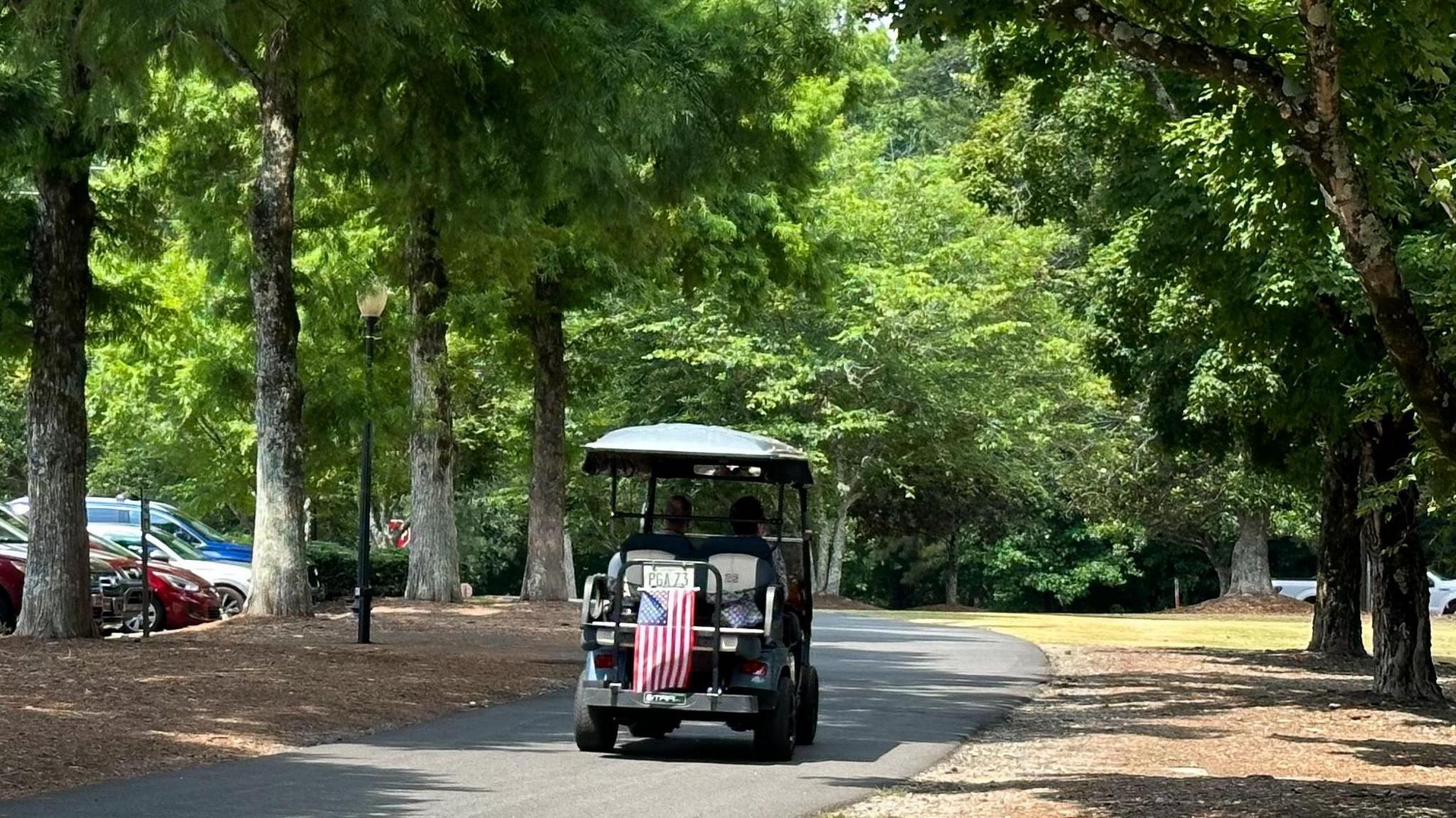
Golf carts are common means of transportation in Peachtree City. Roughly 11,000 golf carts are registered with the city
‘I’m not voting anymore’
In Peachtree City, an idyllic suburb in the Republican stronghold of Fayette County, 100 miles of paved “multi-use” pathways – dominated by golf carts – wind between the city’s lakes and tall lush green trees.
Amid the picturesque landscape here, south-west of Atlanta, signs of a changing demographic hang from flyers in the local library. Brochures printed in dual languages offer everything from free English classes to “linguistically diverse caregivers”.
Buzzing by the library on a Monday afternoon in her golf cart was Alyona Clement, a 32-year-old from Kazakhstan who last voted for Trump in 2016.
“I’m not voting anymore," she said.
She has been in Georgia since arriving to the US in 2005, but moved to Peachtree City with her husband and five children in 2020.
“All the lawsuits that Trump is going through, all these women accusing him of stuff, that’s what turned me off from him,” Ms Clement said, referring to Trump’s legal troubles.
In May, Donald Trump became the first US president convicted of a felony for business fraud charges in New York. He’s facing three other criminal cases, including election fraud charges in Georgia. His mugshot was taken in this state.
Ms Clement is also not considering President Biden, because of his age and “how crazy prices are”.
There are also voters like Alex Smith, a Fayette County transplant who voted for Joe Biden in 2020, but wasn’t living in Georgia at the time. He plans to vote for the president again.
“Biden’s age is an issue, but Trump is just as old,” Mr Smith said, with his three-month-old child strapped to his chest and another running around the Peachtree City playground.
Mr Smith said he likes Mr Biden’s policies and has benefited from the president’s student loan interest reduction programme.
Voters like Ms Clement and Mr Smith will likely undermine the Republican hold on Fayette County, where Trump’s margin of victory decreased by nearly six points in the last election.
Democrats hope gains in areas like this will help to offset declining support for Mr Biden elsewhere in the state.
“Fayette will be the next county to flip [to Democrats],” Prof Bullock said.
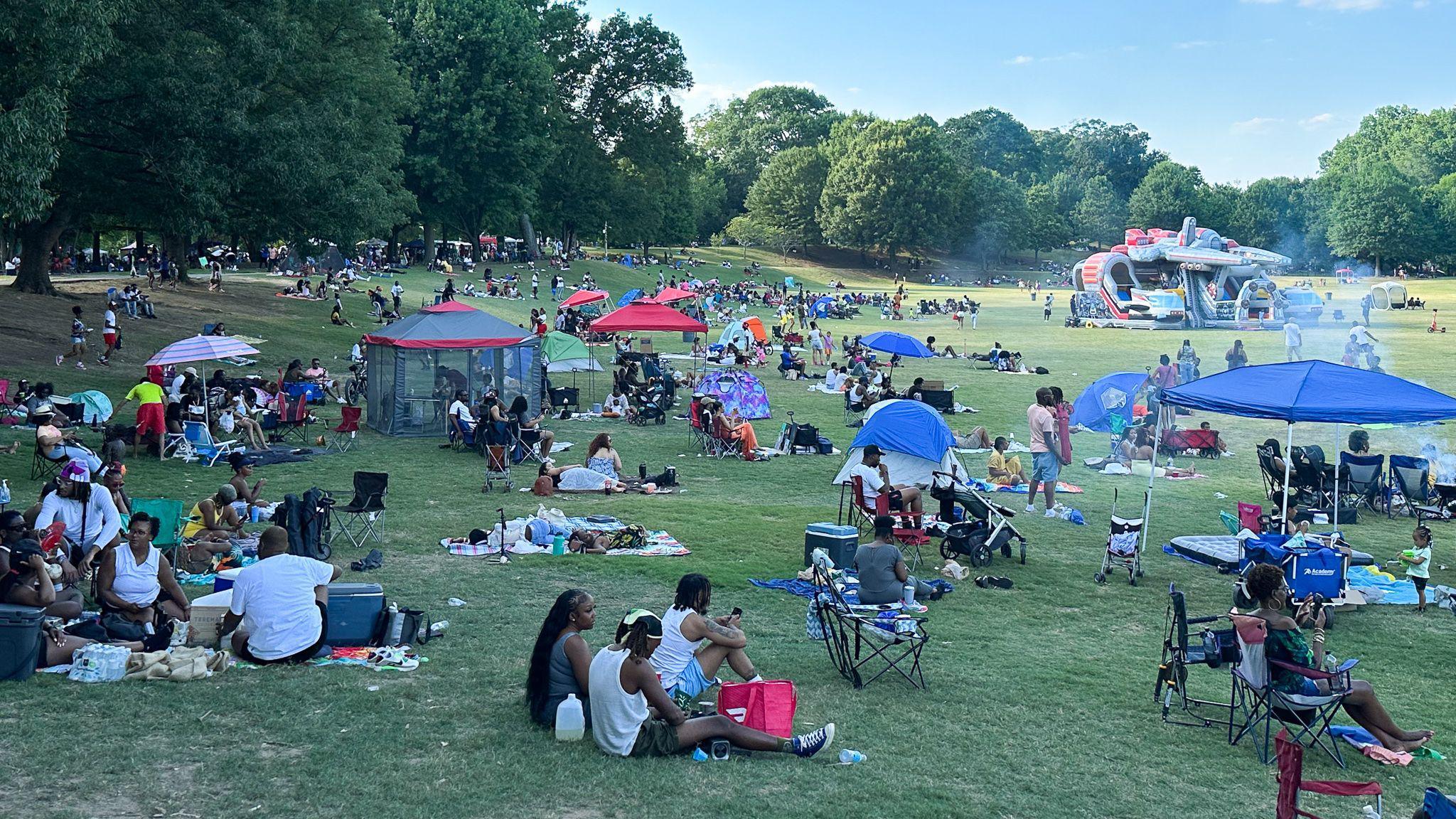
A large crowd was gathered on the final day of Atlanta's Juneteenth celebration on Sunday
But pollsters and strategists say that for the Biden campaign, there's no escaping the fact that black voters propelled the president to victory in Georgia in 2020, and there are real questions about whether they will do so again.
A New York Times and Siena College poll found that in six swing states, including Georgia, 71% of black voters would back Mr Biden in 2024 - a steep drop from the 92% nationally that helped him win the White House at the last election.
Underlying the decline is a generational divide among black voters, with young voters showing less support for Mr Biden than their elders.
At the Piedmont Park Juneteenth celebration, Khalil Robertson, 30, was pushing his child uphill in a stroller.
“I probably won’t vote for either candidate,” he said, pausing under a tree to wipe sweat from his brow. “Biden is selling the country and Trump brings out the racists.”
“It’s the worst of two evils.”
